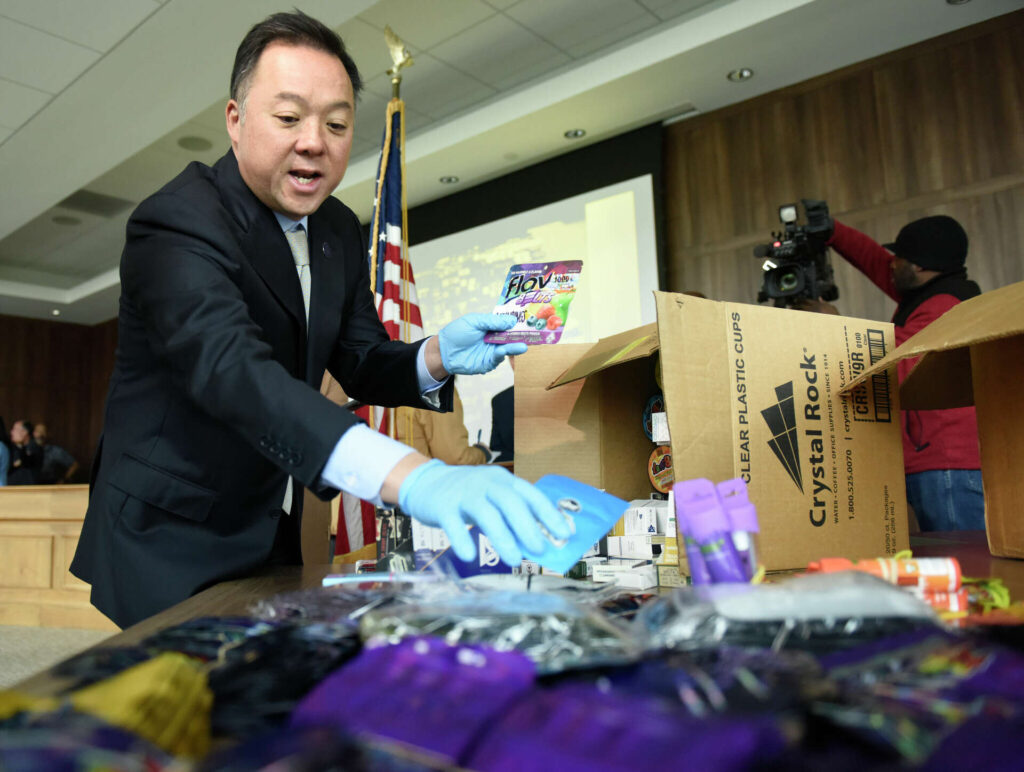Connecticut Attorney General William Tong shows some of the recently-seized illegal delta-8 products during a press conference at the Stamford Police Department in Stamford, Conn. Tuesday, April 11, 2023. Stamford CBD shops Zaza Smoke Shop II, Breeze Smoke Shop and World’s Exotic Smoke Shop were raided for illegal delta-8 THC products and will be charged in civil court for alleged violations of the Connecticut Unfair Trade Practices Act.
A group of Connecticut smoke shop owners and investors have filed a federal lawsuit alleging the state’s redefinition of THC violates federal law.
Plaintiffs allege that an attempt earlier this year to limit the sale of THC, the substance in cannabis that gets you high, conflicts with the 2018 federal law that made hemp legal.
Under federal law, hemp plants and products with less than .3 percent THC are legal to produce and sell. But a Connecticut law passed this year created a new category called “high-THC hemp products, specifically listing edibles, hemp topicals or hemp transdermal patches.
High-THC products may not contain more than 1 milligram of THC per serving, or 5 milligrams of THC per container, as per two laws, including a criminal statute, signed this year by Gov. Ned Lamont and in effect as of Oct. 1.
“We think that there is a constitutional defect in the wording of both the hemp definition in the state of Connecticut as well as that criminal statute,” said Westbrook-based attorney Genevieve Park Taylor, who is representing the plaintiffs. “The state has impermissibly changed the definition of hemp, and that’s what it all boils down to. Hemp is hemp is hemp, and marijuana is marijuana is marijuana, and they’re different things. And in Connecticut, we’re treating them as the same.
Plaintiffs are owners and investors of Puff City-branded stores in Milford, Wallingford, Guilford, Bridgeport, Southington, Shelton, North Haven, East Haven, West Haven and Hamden, and Infinity Smoke Shop in Stratford.
Gov. Ned Lamont, Attorney General William Tong, Chief State’s Attorney Patrick Griffin and Department of Consumer Protection Commissioner Bryan Cafferelli are named as defendants. Tong’s office, which represents the state, declined comment.
A 2018 federal law legalized hemp and its derivatives, including CBD, which has no psychoactive effects. CBD, however, can be chemically converted to THC, resulting in legally sold hemp-derived THC products, as psychoactive as any cannabis sold in state-licensed cannabis stores.
Tong’s office has since prosecuted several smoke shops around Connecticut, calling the products “extraordinarily dangerous.” Tong in March signed onto a letter along with 18 other attorneys general asking for Congress to reexamine the 2018 Farm Bill that made hemp and its derivatives legal.
Taylor said plaintiffs do not argue against the state’s right to regulate hemp or cannabis, but that the definition of hemp in state law conflicts with the federal definition.”
“It’s our position that the 2018 Farm Bill preempts state regulation only as to the term ‘hemp’ and its definition,” she said.
The conflict between the federal and state laws create a “legal quagmire of conflicting rules and definitions that renders them impossibly, impermissibly and unconstitutionally vague and ultimately unenforceable,” according to the complaint.
The intention of the suit is not to seek monetary damages, Taylor said, but “to have the court issue an injunction on the endorsement of all of these changes, and specifically the change in definition of hemp.”
“What we’d like the state to do is just make sure that Connecticut’s rules conform with federal law,” she said.



